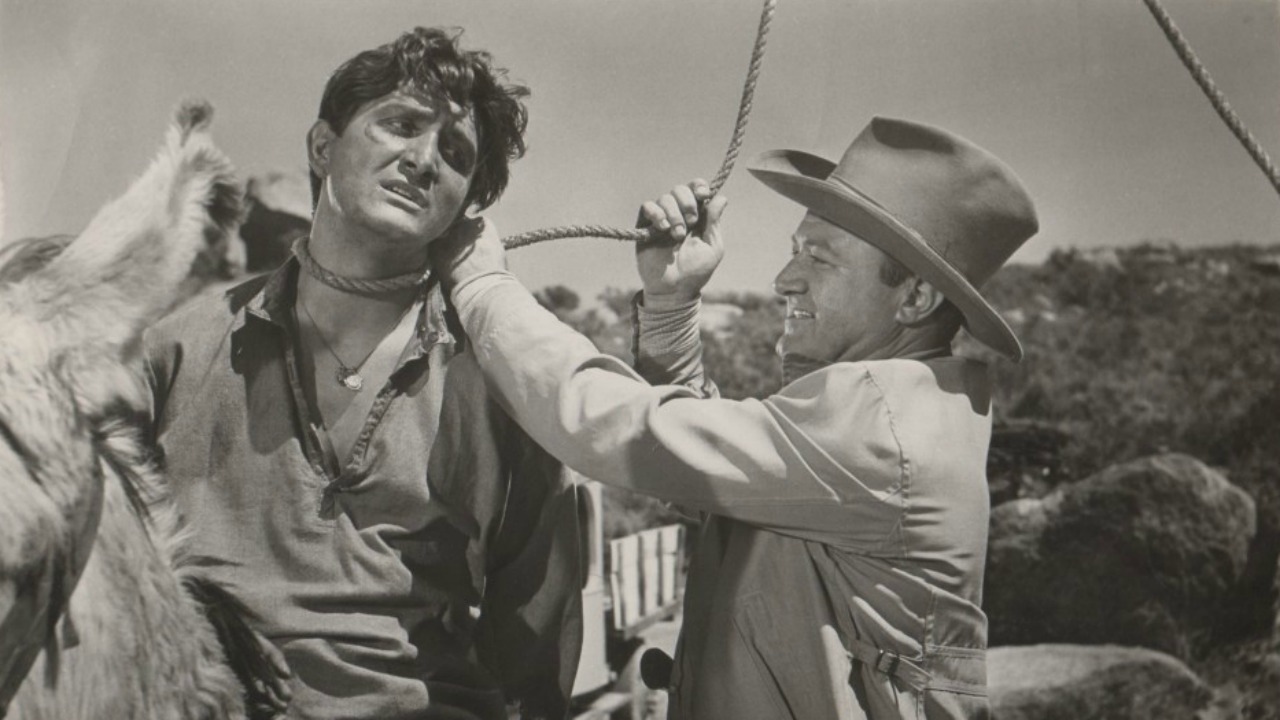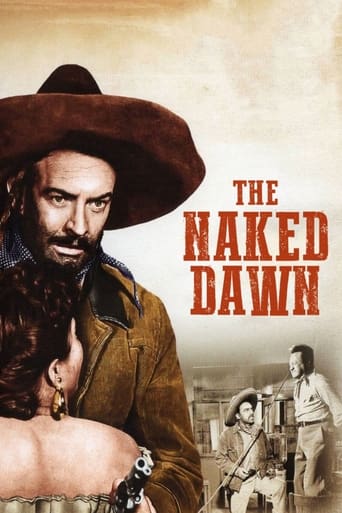Helloturia
I have absolutely never seen anything like this movie before. You have to see this movie.
Humbersi
The first must-see film of the year.
Catangro
After playing with our expectations, this turns out to be a very different sort of film.
Lidia Draper
Great example of an old-fashioned, pure-at-heart escapist event movie that doesn't pretend to be anything that it's not and has boat loads of fun being its own ludicrous self.
dougdoepke
The movie's not a western in the usual sense. Instead, it's more like a pondering of character and life-styles set in modern Mexico. Manuel and Maria are in an arranged marriage, she being passed along like a piece of property, he being a budding farm entrepreneur. They are above all "respectable", and the feeling is that this is what holds the marriage together. Then, into their settled life arrives escaping train robber Santiago. But he's not a typical robber. We know that from his buddy's moving death scene. There Santiago shows something of a poetic sensitivity, proving he's not without his own sense of values. In fact, he's more a free spirit than a criminal type, even giving away much of his loot to deserving strangers. Ironically, however, he appears unfree to be anything but free! It's Santiago's free-wheeling effect on the young couple's brittle marriage that makes up the storyline. Kennedy, of course, was one of that era's premier actors. Here, his bravura performance effectively dramatizes Santiago's free spirit gusto. On the other hand, as the young couple, Iglesias and St. John appear over-the-top at times. Perhaps that can be rationalized by their emotional release from repressed lives. Nevertheless, the emoting does at times distract from story advancement.The notion of respectability is also pondered here. What the screenplay seems to be saying is that conforming lives are okay as long as one's humanity is not sacrificed in the process. In his own eccentric way, this appears the lesson Santiago imparts to the young couple. At the same time, religion gets much the same treatment, while criminal Santiago acts poetically as a kind of secular priest in easing his dying confederate into the great unknown.All in all, the movie's distinctive features come more from blacklisted writer Zimet's offbeat screenplay than from cult director Ulmer who's required to film in Technicolor instead of his b&w forte. Nonetheless, the movie's fully deserving of the Ulmer brand-- an offbeat 80-minutes that manages some depth over and above its tacky 50's title.
bkoganbing
King of the cheapies Edgar Ullmer directed this modern west saga set in Mexico with something he normally didn't have at his disposal, technicolor. Even with that it's certainly one parsimonious production, but not bad.Although why he cast Arthur Kennedy replete with dyed black hair and a greasy beard as a Mexican bandit who knows. This was a role so right for Gilbert Roland. I guess he wasn't available.Nevertheless Kennedy gives it his best as the charismatic bandit who after losing one partner doing a job is ready for another. He takes refuge in the house of farmer Eugene Iglesias and wife Betta St.John. In one way or another he seduces both of them with what they see as a romantic life style. Both want to go off with him and leave the other.The Naked Dawn is a curious little film, deep in character rather than plot. But I think it would have been a classic with a Gilbert Roland or a Fernando Lamas in the lead.
Edgar Soberon Torchia
If for the first half of this drama, you can go through the typical Hollywood depiction of Mexico and its people (dancing flamenco and shouting "Olé"), you will enjoy this tale of greed and treason among common folks, related to one another in different ways. Never mind the mixture of Spanish elements with the Mexican: the description of Mexican culture (which is key to the story, though not essential) is not even offensive, but plainly cheap, funny and sometimes embarrassing for the cast, although Charlita seems to enjoy every minute of her part as a kind of Tongolele lost in a dusty cantina. Since the central plot is interesting enough by itself, we can overlook all the kitsch, for what is being told is universal: how human beings can become negative from one moment to the next, by ambition and lust for material possession. All the three leads are quite effective. I really had never seen Arthur Kennedy so good in a role, practically having the whole film on his shoulders; beautiful Betta St. John is a bit out of range in her dramatic scenes, but she is more convincing here than in those Tarzan movies with Gordon Scott; while Eugene Iglesias is intense enough to suggest the emergence of a lout in less than half a day. As in all of Edgar G. Ulmer's films, no matter how big or small the budget, the visuals are good. The ingredient I enjoyed the less was the proto-Morriconesque score by composer Herschel Burke Gilbert, who could have benefited by going to Plaza Garibaldi in México City and have some tequila and tacos, sing with a mariachi band, and listen to rancheras and other typical Mexican musical forms.
andreas-27
An excellent little western that shows what can be done with a good story, little money, character actors and inspired direction(i.e. with no studio interference). The story unfolds in a slow but well-controlled tempo and proceeds to show how greed changes a kind-hearted man and his family into vicious money-hungry people. Edgar Ulmer, a much underrated but top-grade director, knows how to bring out the deepest and most secret feelings of his characters, through the excellent direction of his actors (Arthur Kennedy gives the best performance of his career) and create tension and the right atmosphere. On the level of John Ford's "Wagonmaster"! Should be seen and enjoyed more often. Makes you want to see more of Ulmer's works. Andreas-27

